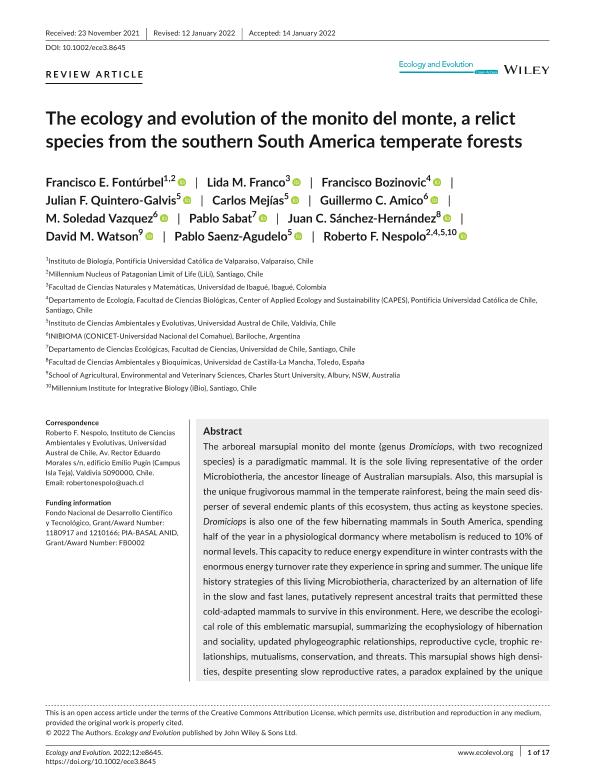Mostrar el registro sencillo del ítem
dc.contributor.author
Fontúrbel, Francisco E.
dc.contributor.author
Franco, Lida M.
dc.contributor.author
Bozinovic, Francisco

dc.contributor.author
Quintero Galvis, Julian F.
dc.contributor.author
Mejías, Carlos
dc.contributor.author
Amico, Guillermo Cesar

dc.contributor.author
Vazquez, Miriam Soledad

dc.contributor.author
Sabat, Pablo
dc.contributor.author
Sánchez Hernández, Juan C.
dc.contributor.author
Watson, David M.
dc.contributor.author
Saenz Agudelo, Pablo
dc.contributor.author
Nespolo, Roberto F.
dc.date.available
2023-09-11T15:24:10Z
dc.date.issued
2022-03
dc.identifier.citation
Fontúrbel, Francisco E.; Franco, Lida M.; Bozinovic, Francisco; Quintero Galvis, Julian F.; Mejías, Carlos; et al.; The ecology and evolution of the monito del monte, a relict species from the southern South America temperate forests; Wiley; Ecology and Evolution; 12; 3; 3-2022; 1-17
dc.identifier.issn
2045-7758
dc.identifier.uri
http://hdl.handle.net/11336/211116
dc.description.abstract
The arboreal marsupial monito del monte (genus Dromiciops, with two recognized species) is a paradigmatic mammal. It is the sole living representative of the order Microbiotheria, the ancestor lineage of Australian marsupials. Also, this marsupial is the unique frugivorous mammal in the temperate rainforest, being the main seed disperser of several endemic plants of this ecosystem, thus acting as keystone species. Dromiciops is also one of the few hibernating mammals in South America, spending half of the year in a physiological dormancy where metabolism is reduced to 10% of normal levels. This capacity to reduce energy expenditure in winter contrasts with the enormous energy turnover rate they experience in spring and summer. The unique life history strategies of this living Microbiotheria, characterized by an alternation of life in the slow and fast lanes, putatively represent ancestral traits that permitted these cold-adapted mammals to survive in this environment. Here, we describe the ecological role of this emblematic marsupial, summarizing the ecophysiology of hibernation and sociality, updated phylogeographic relationships, reproductive cycle, trophic relationships, mutualisms, conservation, and threats. This marsupial shows high densities, despite presenting slow reproductive rates, a paradox explained by the unique characteristics of its three-dimensional habitat. We finally suggest immediate actions to protect these species that may be threatened in the near future due to habitat destruction and climate change.
dc.format
application/pdf
dc.language.iso
eng
dc.publisher
Wiley

dc.rights
info:eu-repo/semantics/openAccess
dc.rights.uri
https://creativecommons.org/licenses/by/2.5/ar/
dc.subject
AUSTRALIDELPHIA
dc.subject
CLIMATE CHANGE
dc.subject
CONSERVATION
dc.subject
HIBERNATION
dc.subject
MARSUPIAL
dc.subject
SEED DISPERSAL
dc.subject.classification
Ecología

dc.subject.classification
Ciencias Biológicas

dc.subject.classification
CIENCIAS NATURALES Y EXACTAS

dc.title
The ecology and evolution of the monito del monte, a relict species from the southern South America temperate forests
dc.type
info:eu-repo/semantics/article
dc.type
info:ar-repo/semantics/artículo
dc.type
info:eu-repo/semantics/publishedVersion
dc.date.updated
2023-06-29T10:32:56Z
dc.journal.volume
12
dc.journal.number
3
dc.journal.pagination
1-17
dc.journal.pais
Reino Unido

dc.description.fil
Fil: Fontúrbel, Francisco E.. Pontificia Universidad Católica de Valparaíso; Chile
dc.description.fil
Fil: Franco, Lida M.. Universidad de Ibagué; Colombia
dc.description.fil
Fil: Bozinovic, Francisco. Pontificia Universidad Católica de Chile; Chile
dc.description.fil
Fil: Quintero Galvis, Julian F.. Universidad Austral de Chile; Chile
dc.description.fil
Fil: Mejías, Carlos. Universidad Austral de Chile; Chile
dc.description.fil
Fil: Amico, Guillermo Cesar. Consejo Nacional de Investigaciones Científicas y Técnicas. Centro Científico Tecnológico Conicet - Patagonia Norte. Instituto de Investigaciones en Biodiversidad y Medioambiente. Universidad Nacional del Comahue. Centro Regional Universidad Bariloche. Instituto de Investigaciones en Biodiversidad y Medioambiente; Argentina
dc.description.fil
Fil: Vazquez, Miriam Soledad. Consejo Nacional de Investigaciones Científicas y Técnicas. Centro Científico Tecnológico Conicet - Patagonia Norte. Instituto de Investigaciones en Biodiversidad y Medioambiente. Universidad Nacional del Comahue. Centro Regional Universidad Bariloche. Instituto de Investigaciones en Biodiversidad y Medioambiente; Argentina
dc.description.fil
Fil: Sabat, Pablo. Universidad de Chile; Chile
dc.description.fil
Fil: Sánchez Hernández, Juan C.. Universidad de Castilla-La Mancha; España
dc.description.fil
Fil: Watson, David M.. Charles Sturt University; Australia
dc.description.fil
Fil: Saenz Agudelo, Pablo. Universidad Austral de Chile; Chile
dc.description.fil
Fil: Nespolo, Roberto F.. Universidad Austral de Chile; Chile
dc.journal.title
Ecology and Evolution
dc.relation.alternativeid
info:eu-repo/semantics/altIdentifier/url/https://onlinelibrary.wiley.com/doi/10.1002/ece3.8645
dc.relation.alternativeid
info:eu-repo/semantics/altIdentifier/doi/http://dx.doi.org/10.1002/ece3.8645
Archivos asociados
